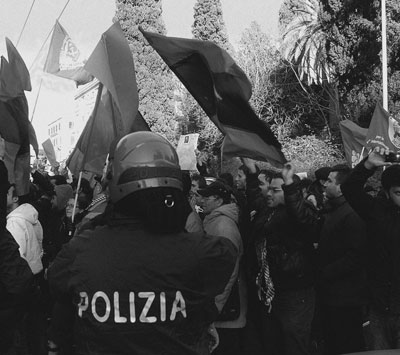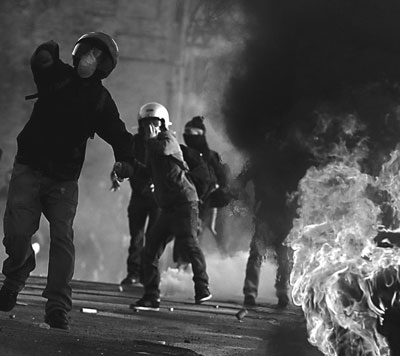"... The spirit of insurrectionary anarchism is that there is now the only resistance that opposes the reformist intrusive utilitarianism. Far from repudiation, precisely for this reason, we consider the best source of our energy. "
 (from "Letters to a socialist" Luigi Fabbri, 1914)
I find it interesting this call to Fabbri, among other well-known for its remoteness from any extremist excess, a reflection on the theme of violence, I find particularly appropriate in a time of growing social contradictions and revolutionary potential (not necessarily libertarian) like the one we are living, in which the combination insurrection and violence is experienced by some as inseparable, as if every violent act is in itself insurrection, and by others as outright inadmissible.
 The power has always played
The power has always played
Referring to the definition of violence I have often stated that the person exercising the ultimate building block of the same - that is, coercion, physical and moral - that is the state with the threat of laws, devices, standards, the establishment of prisons of judicial asylums, etc.. intends to bring individuals to a system of hierarchies and authoritarian ââand owners values, so that is not called into question the presumed legitimacy of power and property.
Similarly, violence can be understood - and this is the interpretation that goes for more - like the statement of a criminal desire that expresses itself in the use of physical force and weapons.
However you read it follows that the violence is presented as a social relationship because it involves two subjects, who exercises it and those who suffer. And as in every social relation, it opens a political problem because its use implies an ethical assessment of what is right and what is not.
To this end it is useful to point out that the word "violence" is used more by the power to denigrate his opponents, real or unless, while, paradoxically, is the power, the State arrogating to themselves the monopoly of weapons and exercising government on society through legislation and laws, the exclusive fruit of the balance of power, exercised compulsion and obligations, then did "violence", although masked by the so-called Machiavellian representative democracy mechanisms.
Because the word "violence" rightly horrified the vast majority of the population, but aspires to a more just, more humane, accusing him of 'violence' his opponents and anyone who is not under his total control, power, and wants to raise spread in society the stigma and fear against them to justify further repression of the legitimate use, more or less violent, reinforced by regular measures "special" launched in words against the "violent", but directed against the entire social body.
On this level has always played the power to divide and crush the opposition movement, accusing the most radical and certain components of 'violence' - exploiting individual facts, causing purposely other, making obvious ingenuity - to put against each other according to the 'ancient principle of "divide and rule".
This strategy, which plays, I repeat, on the rejection of violence by the majority of the population, while feeding the more moderate members of the opposition movements that appear willing to accept the limitations imposed on the way to demonstrate and protest according to the dictates of the government so as not to risk giving a picture of his violent act.
But working in this way, any prospect of change is in fact delegated to elites who vie for power, giving in fact to be protagonists of their own lives and their future, their possibilities of expression by restricting the choice of a 'one off' or events increasingly emptied by a genuine desire to transform the struggles of real made ââincisive, real strikes, boycotts and sabotage, of bodies themselves across

 Glaring errors of analysis and perspective
Glaring errors of analysis and perspective
Given this state of things there are those who respond with acts and proclamations claiming the legitimacy of violent action against the violence of the state, planning to surpass the limits of movement. And he does so by referring to the 'propaganda of the deed' of ancient memory, or nihilistic individualism to a certain tradition or guerrilla-type stoker.
In presenting and experiencing social conflict as a war in the actual course you want to propose a violent 'revolutionary' shake and can involve the masses in this fight already declared that we consider both sides. But, unlike most of the wars, where the parties feel (rightly or wrongly) in war, in the case of class struggle and social conflict, the vast majority of today's lower classes do not feel at war.
Claiming so revolutionary violence as password transforming action of those who oppose the existing order is a gift that is made to the counterparty, the power elite and its political, social and trade union, who use it to turn against each actually unavailable with collaboration and subordination.
You need to keep in mind what are the characteristics and consequences of power today: the rule of capital and the subordination of its dynamics, the fragmentation of much of the population, constantly subject to the conditionings of a hierarchical authoritarian society (patriarchy, a school built for the regimentation, wage labor, the policing, justice, class, etc..) reinforced by a massive use of the means of mass communication, fear of losing their livelihoods (unemployment, job insecurity), the continue stress to consume, a sense of continue inadequacy, alienation, isolation, the commodification of human relationships, etc..
Under these conditions, interpreting social conflict as a war between two contenders on the same level of awareness, clarity of purpose, is a resounding failure analysis and perspective. Perhaps useful to flesh out its ranks of some units, but unable to reverse the overall situation.

 Reasoning and choice
Reasoning and choice
Similarly, the resistance to the violence of power can not be defined 'violence' and the refusal of the systematic use of violence does not imply acceptance of violence both on us and on other subjects.
Being resolute and energetic is a feature of direct action and the anarchists advocated is what sets them apart from the mediation and compromise method of parliamentary reform. But for anarchists the effectiveness of direct action is not expressed by the degree of violence in it, but rather the ability to indicate a feasible way forward by many, to build a collective force to reduce violence as much as possible.
Anarchism, in itself, implies thought and choice of actions, if one side refuses to marry violated the thesis, other settings flatly eschews non-violent, always deferring to the conscience of individuals and the interpretation of the historical moment in anarchism which they live today must be able to combine respect for human values ââthat have always characterized him with the ability to enhance the feeling of freedom and equality found in movements promoting self-management and self-organization, real picks for every real process of revolutionary transformation of society.

